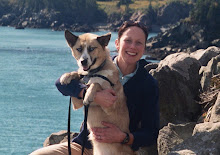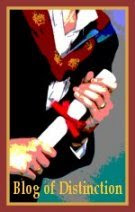
Joel tells us to practice our new obedience skills constantly—but always in a safe place. We work in the living room, the backyard, the corral at dog school. I become arrogant in Ari’s confidence as a student. And so, on the last day of the month, we walk through the woods to our neighbor’s pasture. I’ve picked this locale as a compromise: Ari can still roam free, and as best as I can tell, there’s little that would lure her away. Furthermore, we’re bound in by old rock walls and formidable blackberry bushes, so the pup’s opportunities to stray are severely limited. As we step into the clearing, I cup my hand and ask Ari to sit. She does. We stare at one another for a minute or two, assessing our options.
Eventually, I decide I can trust her impulse for domesticity. I bend down and unhook her leash, holding my breath as I do. She looks momentarily confused, and then delighted. I inhale deeply, ready to take off in pursuit, but Ari stays put. We begin a walk around the circumference of the field. Every three seconds, I look down to make sure the pup is sticking close. She is—contenting herself with some tight little serpentines around my path and always checking in.
We make it all the way around the pasture without incident. I begin to let down my guard, just enough to take in the scenery. It’s a blustery day, and the western wind still holds an arctic chill, in spite of the fact it’s nearly May. The gusts kick up last season’s leaves and cause them to dance about. But that’s not the motion Ari follows. Instead, she casts her gaze far outwards, as if no longer content with what’s at the end of her nose. I look across the field as well. We are both confused: the other side of the pasture appears to be moving and shifting upon itself, as if it were alive.
We walk closer to investigate. Ari raises her puppy hackles, looking cartoonish in her attempt at fierceness. She tries an assertive bark, still high and thin with youth. It’s enough to startle whatever continues to hop across the pasture, and one of them takes flight. As it does, I see an undeniable rosy patch on its breast. A robin! I look more closely. Sure enough, the pasture is filled with nearly fifty robins (Turdus migratorius), hunting for earthworms in the few patches of soft ground.
The puppy has seen birds at our feeders and a few chickadees in the trees outside our house, but these are different. Not only are they strong in number, but they’re all around us and not showing any sign of straying very far. Ari flattens her hackles and instead raises her tail in a robust, full-circle wag. Forget about wolfie predation, these birds could be doggy friends! She takes off in pursuit, arcing through the air in what can only be described as pure joy. She stumbles and tumbles in her excitement, looking more like a rubber ball than a puppy. As she does, the robins disperse, rising en masse to the birch and pine trees.
As I will learn when we return home, these birds are capable of going from a standstill to 20 mph in no time. Furthermore, they know exactly when they need to: not only can they see farther than we can, they can also discriminate more points on the color spectrum and pinpoint the movement of an object with tremendous accuracy. In other words, the chances of Ari ever catching up are slim to none. Still, she runs harder, hoping they might let her follow. I do the same, following not the birds but, rather, the racing puppy. All I can think about are feral whippets running around busy boroughs and Joel’s disapproving face.
“Ari, come!” I shout, knowing the command futile before I even open my mouth. “Ari! Ari?”
Meanwhile, the birds have ensconced themselves high up in the trees, where they sit silently, their soft brown eyes taking in the actions of the pup. Standing below them, Ari appears first confused, then hurt. The robins don’t seem to share her enthusiasm, and they’ve clearly rejected her overture of friendship. She drops her tail and turns to look at me. I feel badly for her. I do my best cheerleader dance, opening wide my arms.
Meanwhile, the birds have ensconced themselves high up in the trees, where they sit silently, their soft brown eyes taking in the actions of the pup. Standing below them, Ari appears first confused, then hurt. The robins don’t seem to share her enthusiasm, and they’ve clearly rejected her overture of friendship. She drops her tail and turns to look at me. I feel badly for her. I do my best cheerleader dance, opening wide my arms.
“Come’ere, puppy,” I sing at the top of my lungs, “Come on, Ari Jindo! Bung Ari Jan Gab!”
I try not to show the apprehension I’m feeling. Even still, I get the impression Ari can sense it. She eyes me and then the robins, as if weighing the appeal of both. I squat down, opening my arms wider.
“Arr-ii,” I sing. “Aarrrrrrriiiiiiiiii. Come back, pup.”
My overtures work. She smiles tentatively, then trots over to accept both a treat and her leash. It’s time to return home.


















1 comments:
This sounds like an exciting adventure.
Post a Comment